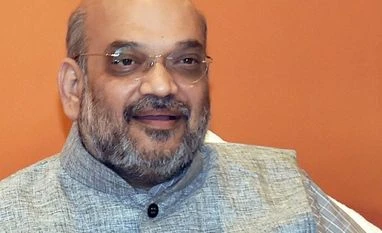A series of developments on Thursday confirmed that a reshuffle of the union council of ministers could take place before Prime Minister Narendra Modi leaves for China to attend the BRICS Summit on Sunday afternoon.
Bharatiya Janata Party (BJP) chief Amit Shah met the PM in the evening. Shah also met Finance Minister Arun Jaitley, and some other ministers earlier in the day.
By late evening, minister of state (independent charge) Rajiv Pratap Rudy had quit. According to sources, five other ministers have also been asked to submit their resignations and help with organisational work of the party.
Shah is slated to attend a Rashtriya Swayamsevak Sangh (RSS) meet that begins in Vrindavan, in Mathura, on Friday. President Ram Nath Kovind is on a visit to Tirupati on Friday, which leaves Saturday and Sunday forenoon as two windows for the oath taking ceremony of the new ministers and those who might be promoted to cabinet rank.
Finance Minister Jaitley is one of the ministers handling more than one portfolio. When asked by media how long he hoped to continue as the defence minister, Jaitley said: “At least for not very long.” He has handled the Defence portfolio after Manohar Parrikar moved to Goa as state’s chief minister in March.
The Cabinet reshuffle has been necessitated to fill vacancies, reduce workload of ministers handling more than a single portfolio, accommodate ally Janata Dal (United) and reinvigorate the cabinet by bringing in fresh blood and sacking the laggards in preparation for the 2019 Lok Sabha polls.
The hallmark of the reshuffle, sources said, could be the PM revisiting his promise of ‘minimum government, maximum governance’, with some of the ministries likely to be merged. This would also help the PM solve the challenge of talent crunch in the BJP ranks. Currently, the Modi council of ministers has 72 members.
With Air India sale on the anvil, some in the government are of the view that an omnibus transport ministry should be set up. In 1985, Rajiv Gandhi had created an omnibus transport ministry under Haryana leader Bansi Lal, with a minister of state for each of the sectors. Modi could appoint an MoS each for roads, shipping, railways, waterways, highways and aviation.
With union minister for oil and natural gas Dharmendra Pradhan slated to play a bigger role in Odisha, where assembly polls are due simultaneously with 2019 Lok Sabha polls, the PM could go in for merging all energy-related sectors into another omnibus ministry. An MoS each could be entrusted with handling coal, power, non-conventional energy resources and petroleum products.
Some of the above suggestions were under consideration when the Modi-led government was sworn in on May 27, 2014, but were dropped in favour of exigencies of politics. Currently, the council of ministers has 72-members.
BJP sources said the meeting with Jaitley and other ministers was a strategy meeting for the forthcoming Gujarat assembly polls, where the party has set its ambition to win ‘150 plus’ of the 182-seats.
By evening Shah appointed Mahendra Nath Pandey as the chief of Uttar Pradesh unit of the party. Pandey is now set to quit as the minister of state for Human Resource Development in the Modi government.
Pandey, a Brahmin, succeeds Keshav Prasad Maurya, an OBC (Other Backward Classes) who is now one of the two Deputy CMs in the Yogi Adityanath-led government in UP. With Pandey, the BJP has invested in a Brahmin face in what is the most crucial state electorally if it has to return to power at the Centre in 2019.
The government also announced several key bureaucratic appointments by evening.
Unlock 30+ premium stories daily hand-picked by our editors, across devices on browser and app.
Pick your 5 favourite companies, get a daily email with all news updates on them.
Full access to our intuitive epaper - clip, save, share articles from any device; newspaper archives from 2006.
Preferential invites to Business Standard events.
Curated newsletters on markets, personal finance, policy & politics, start-ups, technology, and more.
)